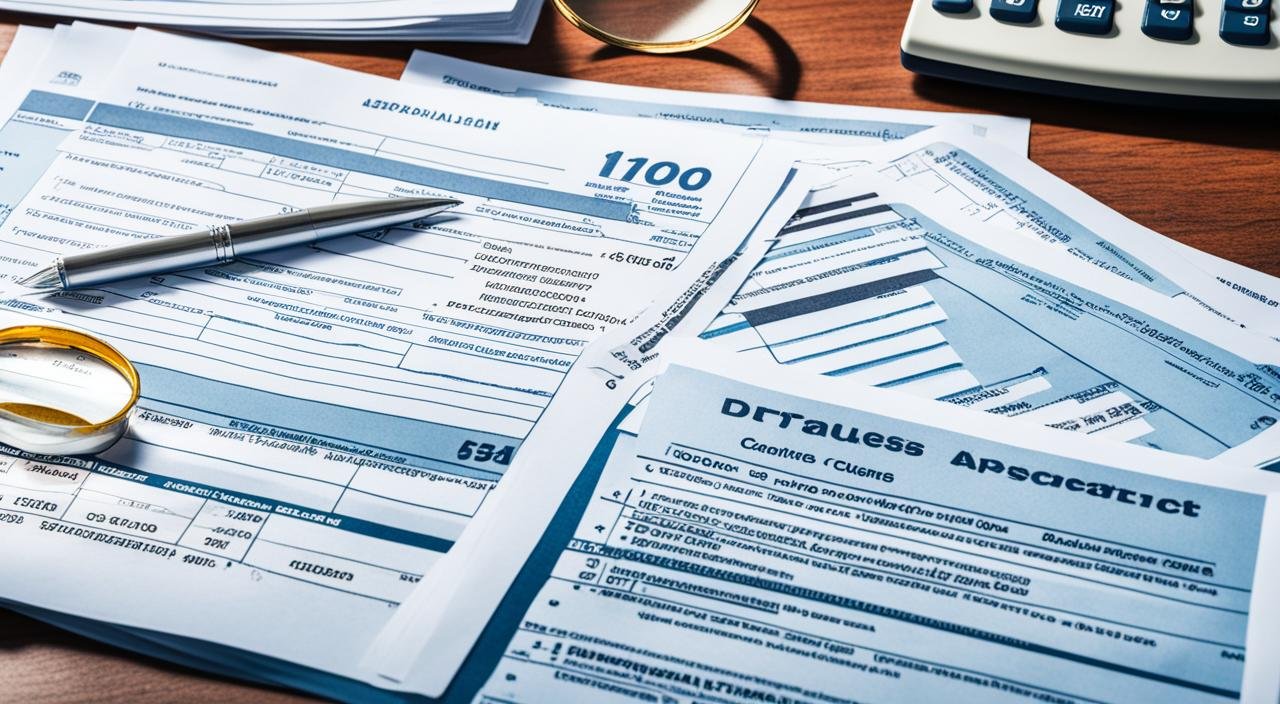Getting a business loan involves meeting specific criteria. Lenders evaluate your creditworthiness and your company’s financial health. You’ll need good personal and business credit scores. They will also check your annual revenue, cash flow, and business operation history.
The industry you’re in, collateral you can offer, and any current debts also matter. A detailed business plan and loan proposal are crucial. Lenders use this information to decide if giving you a loan is risky. This helps them make smart lending choices.
Key Takeaways
- Lenders evaluate your personal and business credit scores to gauge your creditworthiness.
- Demonstrating a strong annual revenue and positive cash flow is crucial for loan approval.
- The length of time your business has been operational and the industry you operate in can impact loan eligibility.
- Providing collateral and personal guarantees can increase your chances of securing a business loan.
- Preparing a detailed business plan and loan proposal is essential for showcasing your company’s viability.
Credit Scores: Personal and Business
Applying for a business loan means your personal and business credit is checked. Keeping your credit scores high is vital for loan approval.
Importance of Good Personal Credit Score
Your personal credit score shows how trustworthy you are with credit. A score of 690 or more is great. It means you have managed your money well. This makes getting loans easier.
If your score is only 500, some online lenders might still help you. But, a higher score is always better. Aim for at least 690.
Building a Strong Business Credit Score
Alongside personal credit, your business credit score counts too. It ranges from 0 to 100. Scoring 80 to 100 is ideal. It shows your business can be trusted to repay loans.
To boost your business score, do certain things. Start by having a business bank account. Also, work on good relationships with those you buy from or sell to. Keep your financial records and payments clean and up-to-date.
Focus on both types of credit scores. This will better your business’s chance of getting the money it needs to expand.
“Building a strong personal and business credit profile is essential when applying for a business loan. Lenders use these scores to assess your overall creditworthiness and financial responsibility.”
Annual Revenue and Cash Flow
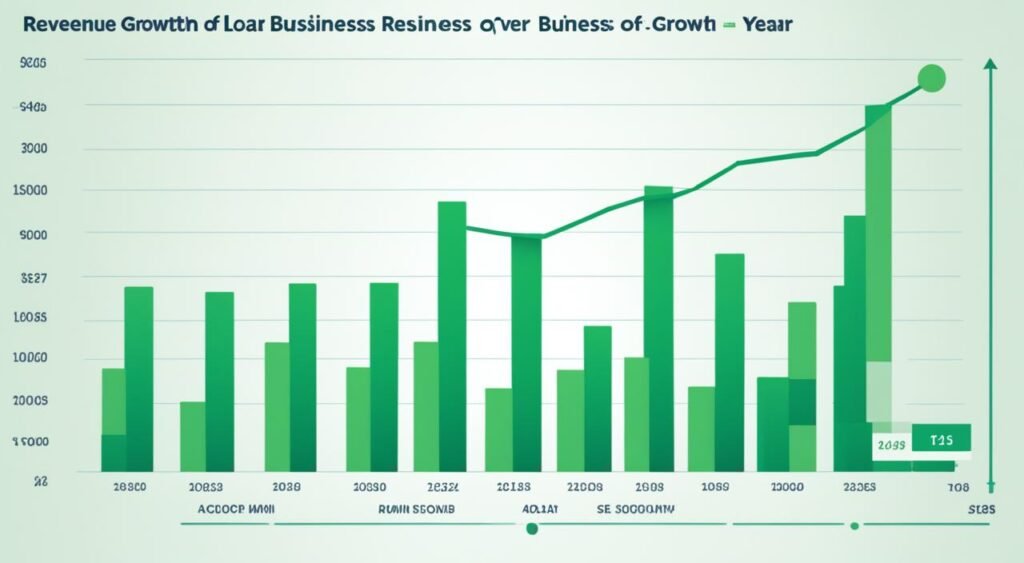
Lenders check your annual revenue and cash flow to see if you can pay back the loan. The minimum revenue requirements needed can change. Online lenders might need just $100,000 in yearly revenue. But, banks may require $250,000 or more.
They also look at your debt service coverage ratio (DSCR). This ratio shows if you have enough money to pay your debts. A DSCR of 1.25 or more is what lenders like to see. It means you can comfortably cover your loan payments.
Minimum Revenue Requirements by Lenders
- Online lenders may only require $100,000 in annual revenue
- Traditional banks often set a higher minimum, such as $250,000 or more
Debt Service Coverage Ratio (DSCR)
The debt service coverage ratio (DSCR) shows how well you can cover your debt with your income. A DSCR of 1.25 or more is preferred by lenders. It shows you have the cash flow to meet your loan payments.
“Lenders want to see that your business has a healthy financial foundation, with sufficient minimum revenue and a strong debt service coverage ratio to ensure timely repayment of the loan.”
Time in Business and Industry Type

The amount of time your business has been operating is key when looking for a loan. Banks often need to see at least 2 years of history. Yet, online lenders might be okay with just 6 months. This shows lenders you have skill and your business is solid, boosting their trust in you to return the loan.
The type of business you run is also very important. Some industries like restaurants and beauty are seen as risky. This makes it tough to get funding. On the other hand, businesses like adult entertainment and gambling usually can’t get regular loans at all.
Getting a loan backed by the Small Business Administration (SBA) means meeting special rules beyond business age and type. These loans have unique needs that must be checked. Knowing these can guide you in spotting if an SBA loan could fit your business financing needs.
| Industry | Typical Minimum Time in Business | Eligibility for Traditional Financing |
|---|---|---|
| Restaurants | 2 years | Higher risk, may require additional collateral |
| Beauty Services | 2 years | Higher risk, may require additional collateral |
| Adult Entertainment | N/A | Ineligible for traditional financing |
| Gambling | N/A | Ineligible for traditional financing |
Knowing about the time in business and eligible industries for loans can help you get the financing you need. This information is vital for your business to expand and succeed.
“A strong business track record and operating in a low-risk industry can significantly improve your chances of getting approved for a business loan.”
Business Plan and Loan Proposal
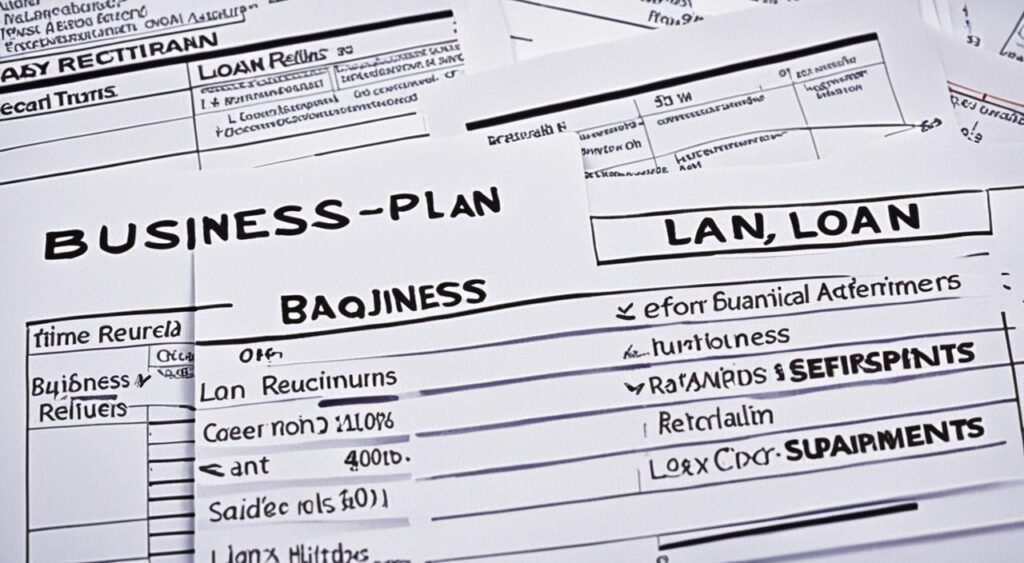
When looking to borrow money for your business, you need a detailed business plan. This plan should show your company’s aims, how it plans to achieve them, and financial outlook. It proves you know how to use the loan well and can pay it back. In this plan, you must also include a loan proposal. This will detail why you need the money, how you’ll use it, and how you plan to repay.
Elements of a Solid Business Plan
Your business plan for getting a loan should have key parts:
- Executive summary: A brief look at your company, its offerings, the market you target, and its financial future.
- Company description: It tells your business story, like its background, who owns it, and what makes it stand out.
- Market analysis: It should dive deep into your industry, who your customers are, and who you’re up against.
- Operations plan: This explains how your business runs, what it needs to operate, and where production happens.
- Financial projections: These are the numbers, showing expected income, what you own and owe, and your money flow outlook.
Purpose and Details of a Loan Proposal
The loan proposal is essential when applying for a loan. It gives your lender a clear view of why you need money and how you’ll pay it back. In this proposal, you must:
- Explain the loan’s purpose: Tell what the money will do for your business and its plans for growth.
- Set loan terms: Say how much you need, when and how you’ll pay it back, and propose an interest rate.
- Talk collateral: Share what you can offer as security for the loan, like assets or personal guarantees.
- Show financial plans: Include financial reports and future predictions to show you can make the money to pay back the loan.
Having a strong business plan and loan proposal tells your lender you’re serious. It shows you’re ready to use the loan to boost your business and able to pay it back. Doing this well boosts your chances of getting the business loan you need to expand your company.
Requirements for a Business Loan
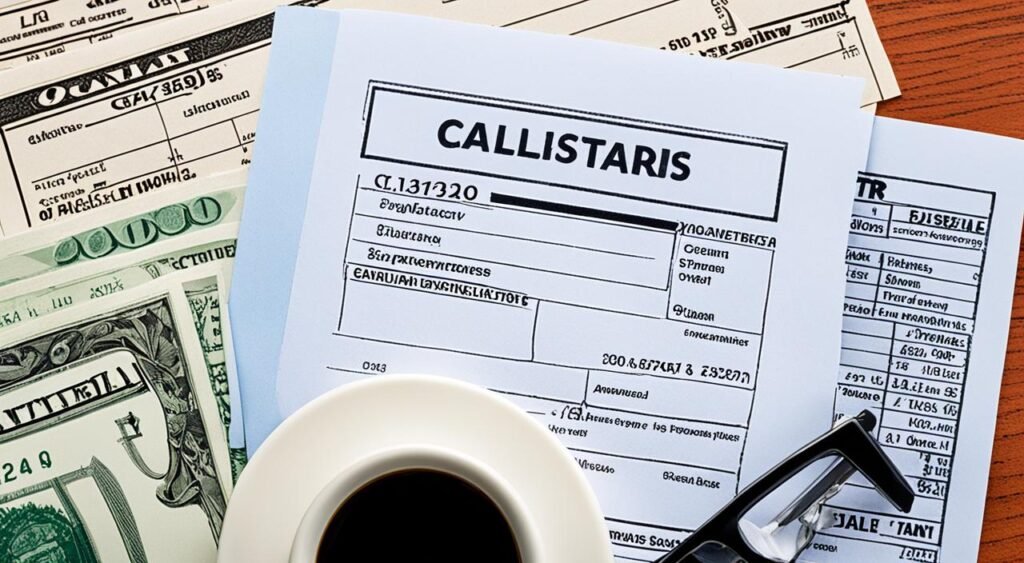
Securing a business loan is more than just high credit and enough money. There are other needs to meet. If you know what these are, it’s easier to get a business loan or small business loan.
Collateral and Personal Guarantees
A big thing for a business loan is having something to put up as collateral. Collateral is something valuable like equipment or land. It’s used to make sure the loan is paid back. If you don’t pay, the lender can take the collateral.
Also, you might need to personally guarantee the loan. This means you promise to pay it back if your business can’t. It shows the lender you are serious about your business’s success. This might help you get better loan terms.
Financial Documentation
Having good financial paperwork is key for a business loan. Lenders will ask for many documents. These include tax returns and financial projections.
- Tax returns (personal and business)
- Bank statements
- Financial projections
- Balance sheets
- Income statements
These papers show your finances and if you can pay back the loan. Giving clear and correct financial data can help you get the loan.
“Lenders want to see that you have a solid plan for how you’ll use the loan and how you’ll repay it. Providing comprehensive financial documentation is key to demonstrating your creditworthiness.”
Knowing and meeting what’s required for a business loan can up your chances of getting the money for your business.
Collateral and Personal Guarantees
Collateral and personal guarantees are key when getting a business loan. Collateral is something the lender can take and sell if the loan isn’t paid. It makes lenders more confident to lend money, seeing they have something to get back.
Personal guarantees also boost a lender’s trust to lend money. With a personal guarantee, the business person promises to pay back the loan. This pledge gives lenders extra faith in financing a business.
Types of Acceptable Collateral
Lenders accept various kinds of collateral for loans, such as:
- Equipment – Machines, vehicles, and other important business items
- Real Estate – Business or owner’s estate properties
- Inventory – Products the business owns, like raw materials or goods
- Accounts Receivable – Money that’s owed to the business by its customers
The collateral’s worth matters a lot to lenders. They must be sure they can sell these items easily if needed. Before approving, the lender checks and approves the collateral for business loan.
Besides collateral, lenders might ask for a personal guarantee for business loan too. This means an owner or important figure agrees to pay the loan if the business can’t.
“Collateral and personal guarantees are common requirements for business loans, helping to mitigate the lender’s risk and increase the chances of loan approval.”
Understanding how collateral and personal guarantees work is essential for business owners. It helps them get ready and improve their chances of getting the needed loan to expand their businesses.
Financial Documentation Required
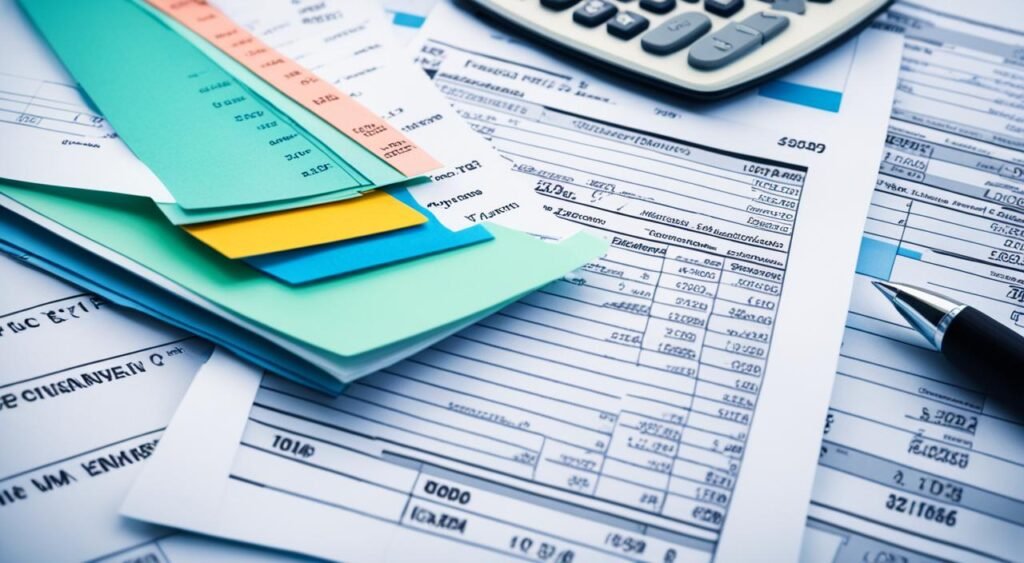
When you apply for a business loan, the lender will ask for many financial and legal documents. They want to see how reliable you are financially. This includes looking at your cash flow and overall financial condition. It helps a lot to get the documents needed for business loan ready before you apply. This way, the business loan application requirements process runs smoother.
What documents might they ask you for? Here are some:
- Personal and business tax returns
- Profit and loss statements
- Balance sheets
- Bank statements
- Proof of collateral, such as property deeds or equipment invoices
Lenders might request more than the basic documents. This could include your driver’s license, any business permits, and leases on commercial properties. It’s wise to collect all of these early. Doing so makes your application look better and shows the lender you’re financially strong.
| Document | Purpose |
|---|---|
| Personal and Business Tax Returns | Give an overview of your financial past and how stable you are. |
| Profit and Loss Statements | Show your business’s income and expenses. This lets the lender see your cash flow better. |
| Balance Sheets | Detail your business’s assets, debts, and net value. It gives the lender an idea of your financial status. |
| Bank Statements | Show your business’s everyday financial activities and account balances. |
| Collateral Documentation | Give evidence of what assets secure the loan and how much they’re worth. |
Make sure you have all the documents needed for business loan ready to go. This makes the business loan application requirements easier. Plus, it tells the lender you know how to manage your money.
Debt-to-Income Ratio
Lenders check your debt-to-income (DTI) ratio when you apply for a business loan. It shows how well you can manage more debt by looking at your monthly payments compared to your income. A low DTI means you’re in a good position to handle a new loan.
It’s best to have a DTI ratio of 43% or less. This shows you can still afford your current debts and a new loan. Keeping your DTI low helps with getting your loan approved and better loan terms.
| Debt-to-Income Ratio | Loan Approval Likelihood | Loan Terms |
|---|---|---|
| Below 43% | Higher | More favorable |
| Above 43% | Lower | Less favorable |
Here’s how you can find your DTI ratio:
- Add all your monthly debts like credit cards, student loans, and car loans.
- Next, divide this total by your gross monthly income (income before taxes).
- The number you get is your DTI ratio.
Keeping an eye on your DTI ratio can help with getting a business loan. It shows lenders you know how to handle more debt. This improves your chances of getting the business funding you need.
“Maintaining a low debt-to-income ratio is crucial in business loan applications. It lets lenders know you can pay your loan back without trouble.”
Eligibility Based on Business Size and Industry
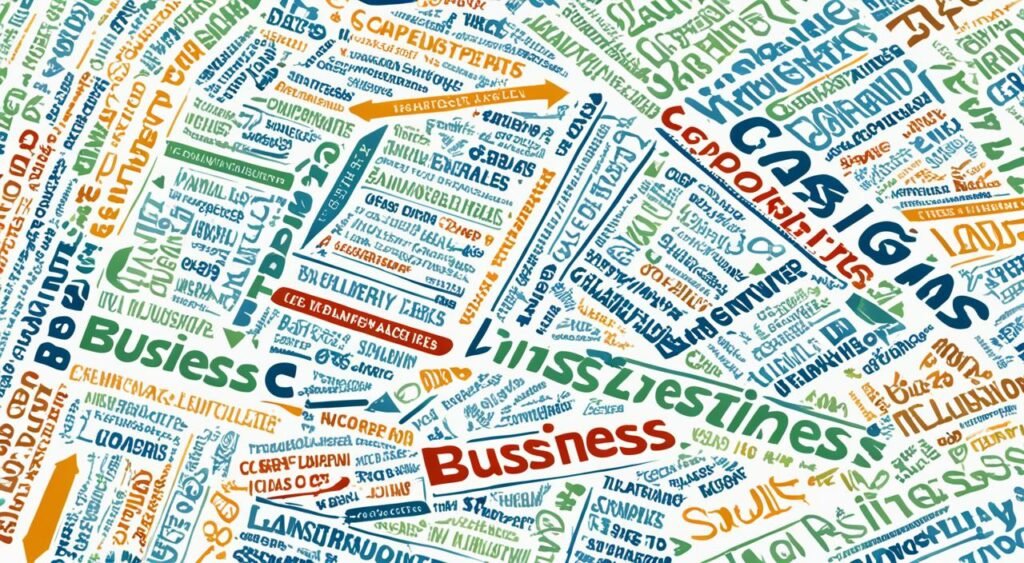
Applying for a business loan? Know that your company’s size and what it does matter a lot. Lenders set rules about the businesses they’ll fund. Knowing these rules can show if your business qualifies for the financing you want.
Small Business Loan Eligibility
Many loan programs, like those from the Small Business Administration (SBA), need your company to be “small.” This is as defined by the SBA. The size rules are different for each industry. They consider things like how much money you make each year or how many people work for you. Getting familiar with the business size requirements for loans is key to finding financing options.
Eligible Industries for Business Loans
Lenders may limit which businesses they’ll fund by their industry type. Some, like real estate investing, gambling, or political lobbying, may find it hard to get a loan. Lenders can also choose not to fund you based on your business’s nature. It’s crucial to figure out which industries your potential lenders are open to.
| Business Size Requirement | Eligible Industries |
|---|---|
|
|
Understand the business size requirements for loans and the eligible industries for business loans to help your company get the funding it needs to grow.
“Lenders often have specific requirements regarding the type and scale of businesses they are willing to work with.”
Also Read: Who Can Get An Income Based Loans?
Conclusion
Getting a business loan means meeting a lot of criteria from lenders. This includes having good credit scores, a certain revenue level, and business history. Also, you might need to offer something as collateral and give personal guarantees. Being ready for these business loan requirements can make your loan application stronger.
To reach your business goals, you need financing. While the business loan requirements can be scary, being prepared can help. With the right documents and planning, you can set your business up to get the funds it needs.
It’s important to know that different lenders might ask for different things. Always research and learn what each lender wants. Being informed and ready for the loan process can help you succeed in your business.
FAQs
What are the basic requirements for a business loan?
When you apply for a business loan, lenders look at many things. These include your personal and business credit scores. They also check your cash flow, time in business, and the type of business you run. They want to see if you can offer collateral. It’s also important to have a detailed business plan and loan proposal ready.
How important are personal and business credit scores for obtaining a business loan?
Your personal and business credit scores matter a lot for getting a loan. A good personal score, over 690, is helpful. It can help you get bank loans and SBA loans more easily. A strong business credit score is important too. It shows that your company is reliable.
What are the minimum revenue requirements set by lenders for business loans?
Lenders check how much money your business makes each year. Online lenders might only need 0,000 yearly. But banks often look for at least 0,000. They also check your debt service coverage ratio. This compares your income against your debts.
How long does a business need to be in operation to qualify for a loan?
How long your business has been running is key to lenders. Banks usually need at least 2 years of history. But, you might get a loan from online lenders after just 6 months. The type of business you have also matters. Some, like restaurants, are seen as riskier.
What information should be included in a business plan and loan proposal?
A solid business plan is a must. It should outline your goals and finances. Your loan proposal, part of the plan, explains the loan’s purpose and how you’ll pay it back. These documents are what lenders expect.
What other requirements do lenders have for a business loan?
Lenders might ask for more than what we’ve talked about. You could need to offer collateral and personal guarantees. Be ready to hand over detailed financial records too. Collateral is something like equipment that you put up to secure your loan. A personal guarantee says you’ll pay the loan back if your business can’t.
What types of collateral are acceptable for a secured business loan?
For a secured business loan, you’ll need to offer something of value. This could be equipment, real estate, or even items you own like inventory. Lenders might also want that personal guarantee from you.
What financial documents are required when applying for a business loan?
When you apply for a loan, you must share various financial and legal documents. These include tax returns, profit and loss statements, and bank statements. Your business’s financial health is what lenders are trying to understand. They use these documents to assess your creditworthiness and cash flow.
How does the debt-to-income (DTI) ratio impact business loan eligibility?
Lenders check your debt-to-income ratio to see if you can handle more debt. It compares how much you owe to how much you make. A lower DTI, under 43%, is good because it shows you can handle your current and new loan payments.
How do the size and industry of a business affect eligibility for certain types of financing?
Your business’s size and what it does matter for certain loans, like SBA loans. For an SBA loan, you need to be a small business in the eyes of the SBA. This varies by industry. Plus, your business must be for-profit and not in certain industries, like real estate, gambling, or political lobbying.
